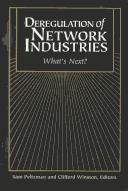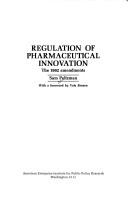| Listing 1 - 10 of 12 | << page >> |
Sort by
|
Book
Year: 1977 Publisher: Cambridge, Mass. National Bureau of Economic Research
Abstract | Keywords | Export | Availability | Bookmark
 Loading...
Loading...Choose an application
- Reference Manager
- EndNote
- RefWorks (Direct export to RefWorks)
Book
Year: 1976 Publisher: Cambridge, Mass. National Bureau of Economic Research
Abstract | Keywords | Export | Availability | Bookmark
 Loading...
Loading...Choose an application
- Reference Manager
- EndNote
- RefWorks (Direct export to RefWorks)
Book
Year: 1977 Publisher: Washington AEI for public policy research
Abstract | Keywords | Export | Availability | Bookmark
 Loading...
Loading...Choose an application
- Reference Manager
- EndNote
- RefWorks (Direct export to RefWorks)
Book
ISBN: 0521629551 9780521629553 Year: 1997 Publisher: Cambridge Cambridge University Press
Abstract | Keywords | Export | Availability | Bookmark
 Loading...
Loading...Choose an application
- Reference Manager
- EndNote
- RefWorks (Direct export to RefWorks)
Criminology. Victimology --- Organized crime --- ondergrondse economie --- fraude --- internationaal --- criminaliteit --- economie souterraine --- international --- criminalite --- Organized crime - Congresses.

ISBN: 0815770049 Year: 2000 Publisher: Washington, D.C. Brookings Institution
Abstract | Keywords | Export | Availability | Bookmark
 Loading...
Loading...Choose an application
- Reference Manager
- EndNote
- RefWorks (Direct export to RefWorks)
Industrial economics --- Public economics --- Telecommunication services --- United States of America
Book
ISBN: 081571341X Year: 2000 Publisher: Washington, D.C. : AEI-Brookings Joint Center for Regulatory Studies,
Abstract | Keywords | Export | Availability | Bookmark
 Loading...
Loading...Choose an application
- Reference Manager
- EndNote
- RefWorks (Direct export to RefWorks)
Business networks --- Industrial policy --- Deregulation --- Electric utilities --- Telecommunication --- Railroads --- Airlines --- Public utilities --- Government policy --- Deregulation --- Deregulation --- Deregulation --- Deregulation --- Deregulation

ISBN: 0844731285 Year: 1974 Publisher: Washington AEI for public policy research
Abstract | Keywords | Export | Availability | Bookmark
 Loading...
Loading...Choose an application
- Reference Manager
- EndNote
- RefWorks (Direct export to RefWorks)
Book
Abstract | Keywords | Export | Availability | Bookmark
 Loading...
Loading...Choose an application
- Reference Manager
- EndNote
- RefWorks (Direct export to RefWorks)
Book
Year: 1977 Publisher: Cambridge, Mass. National Bureau of Economic Research
Abstract | Keywords | Export | Availability | Bookmark
 Loading...
Loading...Choose an application
- Reference Manager
- EndNote
- RefWorks (Direct export to RefWorks)
In essence, this paper will try to decompose the concentration-profits relationship into separate concentration-price arid concentration-cost relationships. By doing this, I hope to shed light on some of the allocative and distributive issues that, I suspect, give the subject its intrinsic interest, but which have not so far been confronted empirically: Does high concentration save or waste resources? Does it lead to higher prices? Who gains and loses from a social policy hostile to high concentration? Since the unique aspect of the paper is its focus on a concentration-cost relationship, most of the analytical effort is spent here. I review the theory underlying such a relationship, and develop and implement a model designed to estimate its importance. Subsequently, I try to estimate how much of the usual profit-concentration relationship is due to cost effects and how much to price effects. The main conclusion is that, while price effects are not absent, the cost effects so dominate them as to cast doubt on the efficacy of any general legal rule hostile to industrial concentration.
Book
Year: 1976 Publisher: Cambridge, Mass. National Bureau of Economic Research
Abstract | Keywords | Export | Availability | Bookmark
 Loading...
Loading...Choose an application
- Reference Manager
- EndNote
- RefWorks (Direct export to RefWorks)
In previous literature, George Stigler asserts a law of diminishing returns to group size in politics: Beyond some point it becomes counterproductive to dilute the per capita transfer. Since the total transfer is endogenous, there is a corollary that dirninishing returns apply to the transfer as well, due both to the opposition provoked by the transfer and to the demand this opposition exerts on resources to quiet it. Stigler does not himself formalize this model, and my first task will be to do just this. My simplified formal version of his model produces a result to which Stigler gave only passing recognition, namely that the costs of using the political process limit not only the size of the dominant group but also their gains. This is at one level, a detail, which is the way Stigler treated it, but a detail with some important implications -- for entry into regulation, and for the price-output structure that emerges from regulation. The main task of the paper is to derive these implications from a generalization of Stigler's model.
| Listing 1 - 10 of 12 | << page >> |
Sort by
|

 Search
Search Feedback
Feedback About
About Help
Help News
News